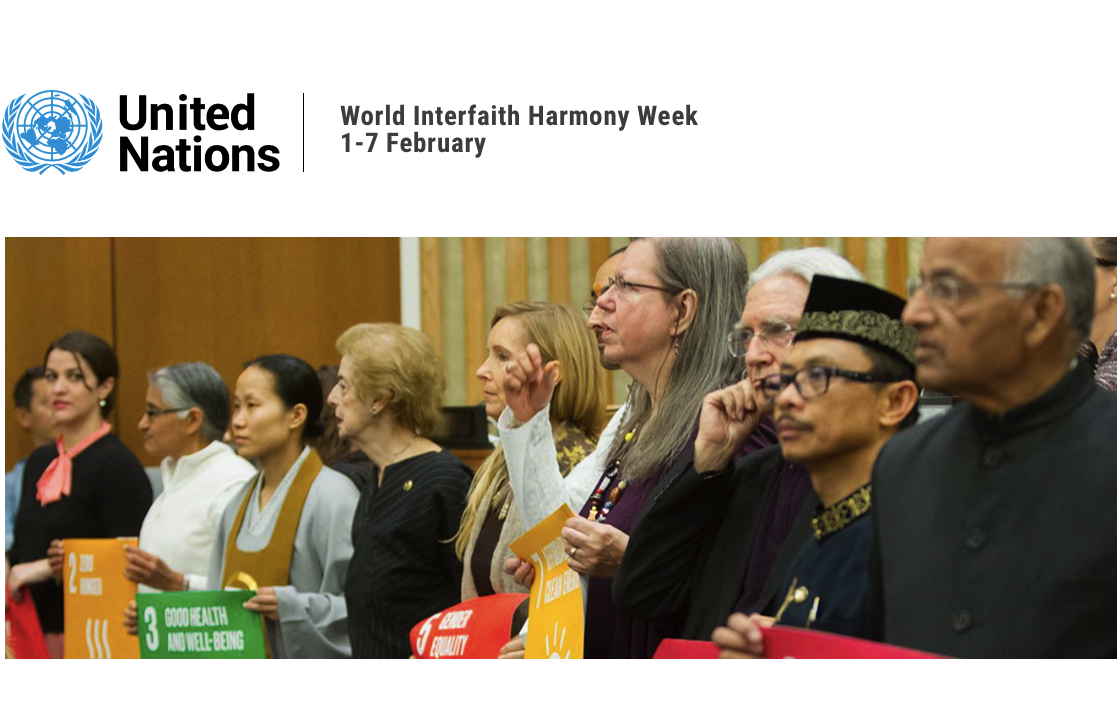TOLERANCE & SOLIDARITY .
An article from the Lutheran World News (non-commercial use)
During the first week of February, the Lutheran World Federation (LWF) is joining with the World Council of Churches (WCC) and many other faith-based organizations to mark the 10th edition of World Interfaith Harmony Week.

Photo from the celebration at the United Nations
The annual event was first proposed by King Abdullah II of Jordan and adopted unanimously by the UN General Assembly in October 2010. The following year, the LWF Council responded by encouraging all its member churches to enhance understanding, harmony, and cooperation among people of different faiths in their respective contexts.
To mark this year’s event, the LWF’s Program Executive for Public Theology and Interreligious Relations, Rev. Dr Sivin Kit, is participating in a round table discussion entitled ‘Rethinking Interreligious Engagement in a Wounded World.’ The event, to be held on 7 February in Geneva’s Ecumenical Center, is sponsored by the WCC and includes religious leaders from different faith groups alongside diplomats, peace activists and members of grass-roots communities.
(continued in right column)
How can different faiths work together for understanding and harmony?
(continued from left column).
Dialogue integral to Christian life and witness
Kit, who was ordained and worked in the multifaith context of his native Malaysia, says: “Dialogue and engagement with people of other faiths, in a humble manner, is integral to our Christian life and witness.” He adds: “Healthy interreligious relations are particularly relevant in today’s world, where we are not only aware of religious diversity and vitality in society, but also how religion is easily misused for political mileage.”
Personal relationships, practical cooperation and a shared sense of community, Kit believes, are the keys to building trust and improving interfaith harmony. To help promote greater understanding of other faith communities, the LWF is publishing an online reader with a selection of articles exploring some of the key issues at the heart of the Christian’s encounter with believers from other faith communities.
Blessed are the peacemakers
Interfaith dialogue and cooperation to build mutual understanding is a priority for the LWF and a daily reality for members of many of its member churches and World Service country programs in different parts of the globe. In 2018, World Service staff worked closely with Islamic Relief Worldwide (IRW) to publish a practical guide entitled ‘A Faith Sensitive Approach in Humanitarian Response’. The LWF is currently working with IRW to organize an international conference in October 2020 entitled ‘Welcoming the Stranger, Shaping the Future’.
The World Interfaith Harmony Week, Kit says, is an important reminder “that we need to work harder to cultivate healthy interfaith relations by reaching out to those who are unlike us (and perhaps to those who don’t like us too). This week can serve as an opportunity for us to create safe spaces where people of different faiths can share about the rewards and challenges of living in their respective contexts.”
In some cases, he continues, “these contexts reflect highly secularized environments; in other situations, religious communities are confronted with political instability and even the threat of violence. In times like this, how do we interpret the multifaith reality we live in? Is it a threat to our religious survival or can it be an opportunity for us to be peacemakers? The answer from the words of Jesus is clear: “Blessed are the peacemakers, for they will be called the children of God.”